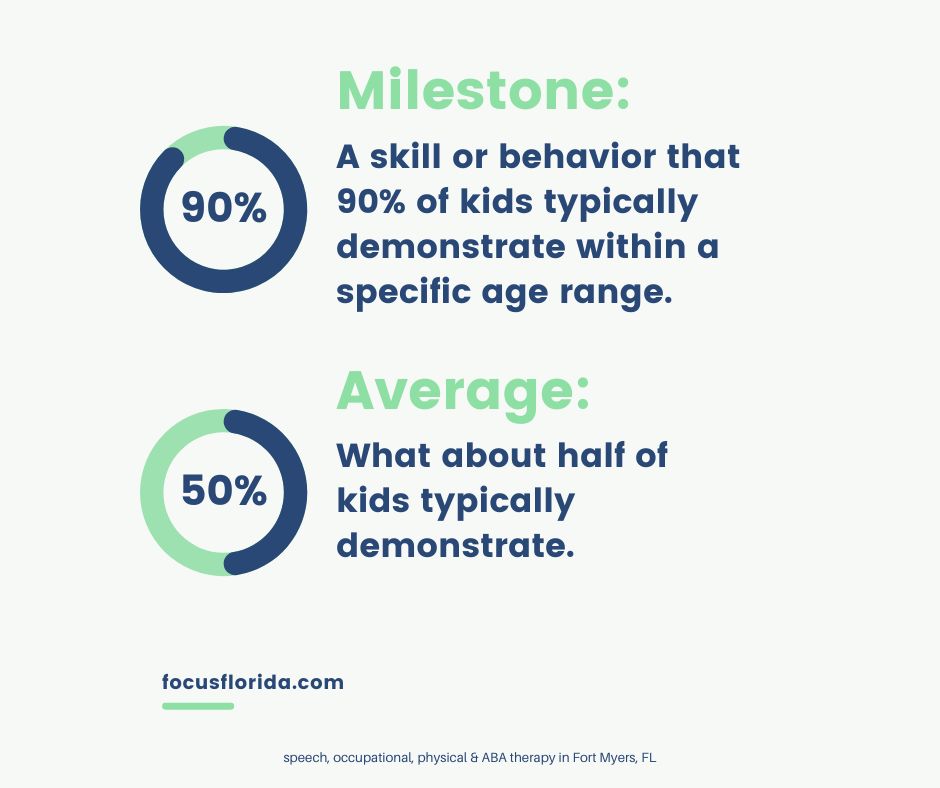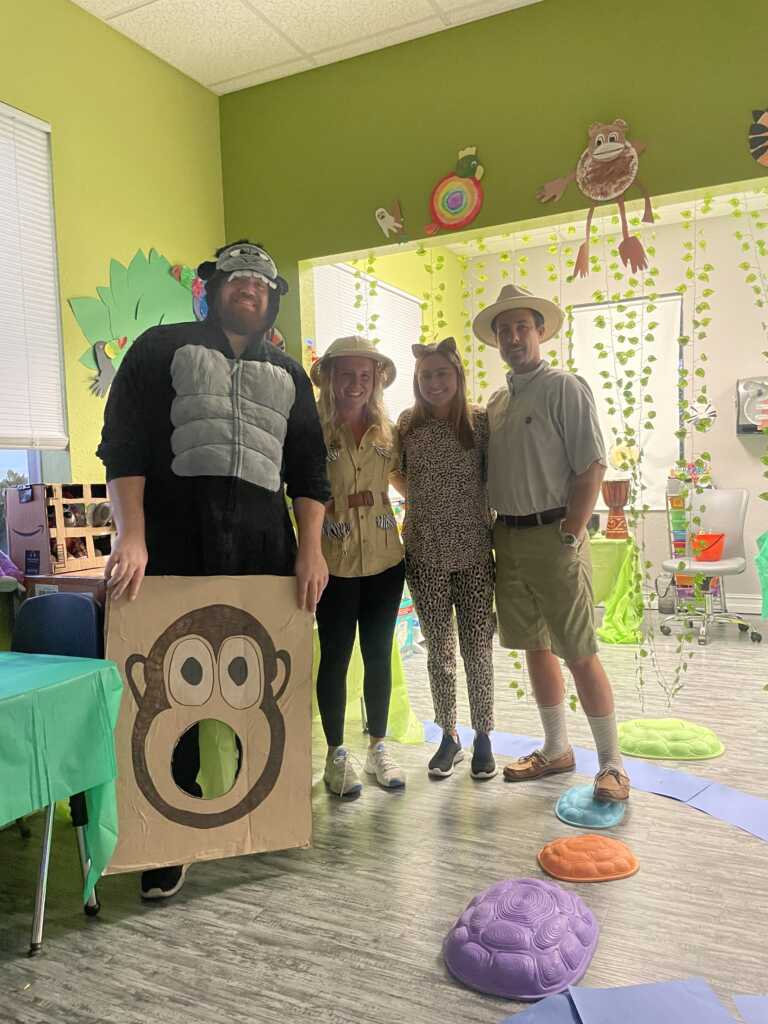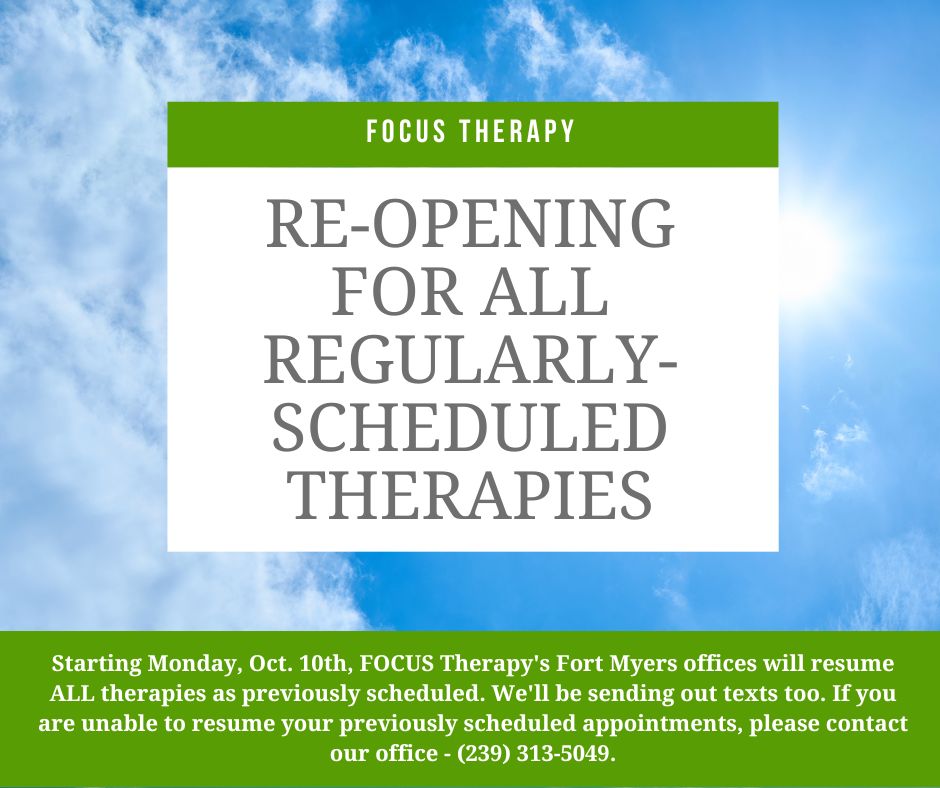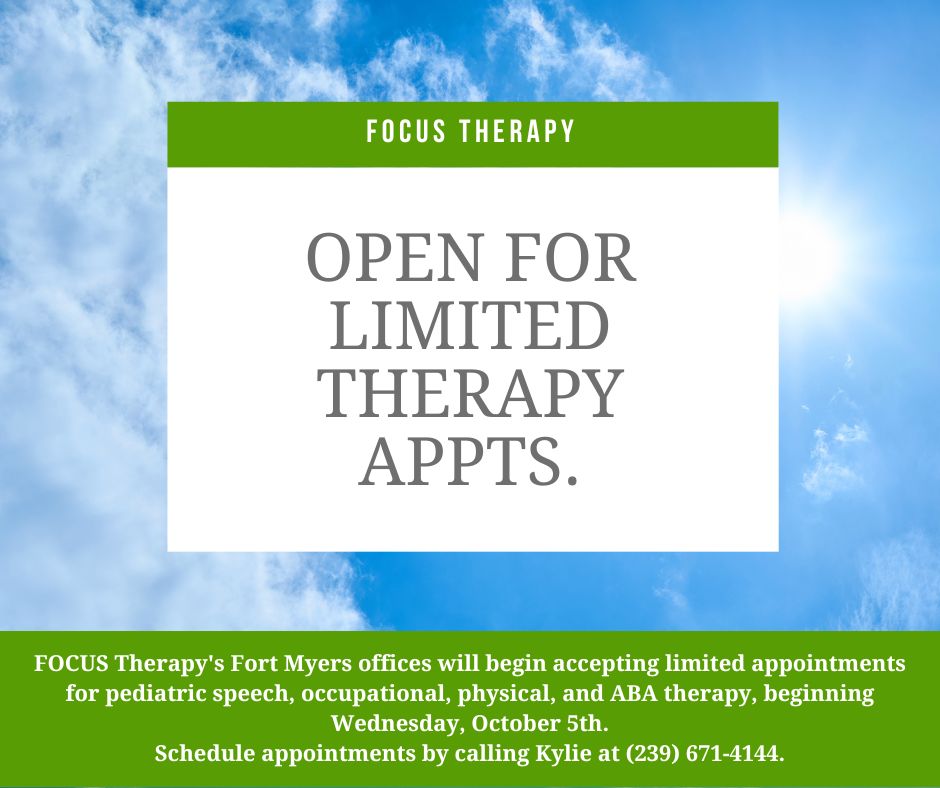Blog
Common Child Speech-Language Disorders & How Fort Myers Speech Therapy Helps!
If you’re concerned that your child may have a speech-language disorder – you aren’t alone. The American Speech-Language Hearing Association (ASHA) estimates 8 percent of U.S. kids ages 3 to 17 (about 1 in 12) have a disorder related to speech, voice, language, or swallowing. Kids younger than 3 can be diagnosed with speech & language disorders and delays too. As dedicated providers of Fort Myers speech therapy for kids, we can firmly attest to the remarkable positive impact of early intervention therapies. Children whose speech & language disorders are identified and treated very early are more likely to have no discernable communication issues as they get older.
The effectiveness of your child’s Fort Myers speech therapy (and other early interventions like ABA therapy and occupational therapy) depend on a number of factors, including:
- The type and severity of the underlying condition(s).
- The age of the child when intervention begins.
- The intensity of the intervention schedule (length and frequency).
- At-home reinforcement and consistency.
Our knowledgeable, dedicated team of Southwest Florida speech-language pathologists at FOCUS Therapy is well-prepared to treat children with a broad range of delays and disorders. That said, there are some pediatric speech-language deficits that are more common than others.
Among those:
- Speech or articulation delays. While you might hear the terms “speech” and “language” used a bit interchangeably, they’re technically different skills. Speech is the mechanical or motor aspect of talking. Common speech and articulation delays among kids include things like stuttering, incorrectly combining sounds, or difficulty pronouncing words. Sometimes there is a physical reason for this (like a cleft palate), but the cause isn’t always clear. Some speech delays are related to global developmental conditions, like autism spectrum disorder or Down syndrome. Other times, they crop up as a singular issue. Speech and articulation delays may not require intervention, but it’s important to consult with a pediatric speech therapist before making that call.
- Expressive language disorders. These are conditions that involve problems with verbal expression. Often, these are conditions where kids may have difficulty formulating their thoughts or combining words to form a complete thought or sentence. Speech-language therapists can help kids with expressive language disorders by clearly identifying the issue, and then helping the child work on sound-letter associations, phonics, and pre-literacy skills.
- Receptive language disorders. Sometimes referred to as language processing disorders, these are conditions where the child can hear perfectly find, but they have difficulty decoding the meaning in their brains. Sometimes, language processing disorders may be initially misdiagnosed as speech delays, because they look very similar early on. Another reason parents and caregivers might miss receptive language disorders is because so much of early language is repetitive and can be memorized. For example, if you regularly say, “time for your bath!” your child may recognize the sound pattern and march themselves to the bathroom, but it doesn’t mean they necessarily understand the individual components of that sentence: “time,” “your,” and “bath.”
- Social and pragmatic speech disorders. Effectively using language in the correct context during social situations is a skill we call “pragmatics.” Kids who have social pragmatic communication disorder have difficulty with verbal and non-verbal communication that can’t be explained by low cognitive ability. They might talk nonstop without recognizing the other person isn’t engaged or listening. They might interject at inappropriate times or with non sequitur responses. They may fail to “take turns” when talking, or fail to make eye contact, or breeze over certain social “rules” most of us recognize as inherent to communication in social settings.
- Voice disorders. About 5 percent of kids have chronic voice disorders. These involve difficulty with voice pitch, volume, quality, etc. One’s voice may sound hoarse or harsh, too high or low, too loud or too quiet, etc. Causes vary, but can include polyps and nodules on the vocal chord, infections, acid reflux, poor movement of vocal folds, etc. Speech therapy exercises can be helpful for children with weak voices and other voice disorders.

Why Early Intervention Fort Myers Speech Therapy Makes a Difference
Years ago, pediatricians tended to adhere to a “wait-and-see” approach, which basically involves hanging back and waiting to see if concerns about speech-language development were still lingering once a child hit school-age. That has largely shifted in favor of early diagnosis and treatment of speech-language disorders because research has shown more effective results with treatment the earlier interventions begin.
Researchers examining the reason behind early intervention’s effectiveness have largely concluded that the younger the child, the more malleable their brains. As noted by the CDC, these “neural circuits” are the connectors in a child’s brain. They are most easily adaptable during the first 3 years of life. For kids with speech-language delays and disorders, those neural circuits are often missing key connections. Early intervention helps reroute them.
Children begin recognizing recurring speech patterns during their first year of life. Babies 12-18-month-old can usually understand at least a few words in the absence of gestural or other cues. They can also usually produce at least a few intelligible words. These combined skills show them acquiring both expressive and receptive speech-language skills.
Of course, spotting a speech problem in a 2-year-old is a bit trickier than in a 6-year-old. That’s not to say evaluations should wait. It’s just that toddlers as a whole are only just starting to grasp speech patterns, so things like lisping and slurring and mispronunciations are fairly common. That’s why often with younger kids, our speech therapists are less concerned with the accuracy of their word articulation and more focused on whether and how they’re trying to communicate. If they’re older than 1 and not using any words, that could be cause for concern – particularly if they aren’t using gestures, displaying a understanding of what’s being said to them, or showing any notable response their own name. Those can be an indicator of bigger issue – possibly autism, but also maybe non-related speech-language delays or disorders. In any case, it’s better to have them evaluated sooner than later.
Another way to think about early intervention speech therapy: Early on, missed speech-language milestones will be counted in months. But let enough time go by without treatment, and the delay will compound by years. A child who receives Fort Myers speech therapy at 18 months may be 6 months delayed, while another child with similar delays but doesn’t start treatment until they are 3 will be 1.5 years behind. The earlier a child starts receiving therapy, the better chance they have to catch up sooner.
If you have additional questions about early intervention speech therapy for your child, we offer initial consultations as well as comprehensive speech-language evaluations and ADOS testing.
FOCUS offers pediatric speech therapy in Fort Myers and throughout Southwest Florida. Call (239) 313.5049 or Contact Us online.
Additional Resources:
Why Act Early if You’re Concerned about Development? U.S. Centers for Disease Control and Prevention
More Blog Entries:
The Best Age for Fort Myers Speech Therapy? Mind the Milestones., Nov. 3, 2022, Fort Myers Speech Therapy Blog
- Categorized: Speech Therapy
- Tagged: Fort Myers speech therapy, speech therapy
FOCUS Therapy Whole-Clinic Hide-and-Seek Helps Kids Sharpen Key Skills
We always have fun at FOCUS Therapy ![]() – but today was
– but today was ![]() extra
extra![]() fun…. This gorgeous, sunny weather
fun…. This gorgeous, sunny weather ![]() spurred us into a whole-clinic game of hide-and-seek with all our kids & therapists!
spurred us into a whole-clinic game of hide-and-seek with all our kids & therapists!
How does this help kids with therapy goals for speech, OT, PT, and ABA, you ask? SO many ways! ![]()

We worked on executive functioning skills (thinking/organization) ![]() like counting, deciding on a “safe spot,” and memorizing key phrases like, “ready or not, here I come!” They also practiced social skills like turn-taking, encouraging friends, waiting quietly, and being a good sport.
like counting, deciding on a “safe spot,” and memorizing key phrases like, “ready or not, here I come!” They also practiced social skills like turn-taking, encouraging friends, waiting quietly, and being a good sport. ![]()
![]()
![]() And we can’t overlook all the gross motor skills practice & physical exercise they squeezed in with activities like running,
And we can’t overlook all the gross motor skills practice & physical exercise they squeezed in with activities like running,![]() squatting, balance, and spatial awareness.
squatting, balance, and spatial awareness.
After the game, we wound down with a “comprehension session,” all gathering on a circle rug where we practiced classroom/school readiness skills like raising hands, taking turns, listening when others are talking, and asking/answering who-what-when-why-where-how questions.
![]()
![]() From the outside looking in, sometimes FOCUS Therapy sessions look like we’re “just having fun.” But that’s because we WANT it to be fun!
From the outside looking in, sometimes FOCUS Therapy sessions look like we’re “just having fun.” But that’s because we WANT it to be fun! ![]() Research shows kids learn best and are driven to give their all when they’re happy, engaged, and having a blast!
Research shows kids learn best and are driven to give their all when they’re happy, engaged, and having a blast! ![]()
FOCUS Therapy offers speech therapy, ABA therapy, occupational therapy, and physical therapy to kids in Fort Myers and throughout Southwest Florida. Call (239) 313.5049 or Contact Us online.
- Categorized: FOCUS News
The Best Age for Fort Myers Speech Therapy? Mind the Milestones.
When we’re looking at the best age for kids to start a Fort Myers speech therapy program, one thing we’re going to zoom in on is whether they’re meeting certain developmental and language milestones.
In the first 3 years of life, a child’s brain grows and matures rapidly. It’s an intensive period for acquiring critical speech and language skills. These are developed in a world that is rich with sights, sounds, and regular exposure to the speech and language use of the people all around them – parents, daycare workers, siblings, grandparents, cousins, friends, shop workers, and more.
One of the reasons language develops so fast during this time period is that the brain of a baby, toddler, and young child has a great deal of plasticity. What this means is it’s able to absorb a great deal for quickly. It also means that the neuropathways that allow us to cement certain skillsets are not yet rigid. So if one neuropathway isn’t working as it should, new ones can develop – assuming they are taught to do so. This is why early intervention therapies are so important.
Speech and language development can vary from child-to-child, but if they’re missing major milestones, it’s important to take action.

Too often, we see parents and even some specialists take a “wait-and-see” approach if a child isn’t meeting these milestones. But it’s our firm belief this is a mistake. Because just as quickly as kids develop these skills, they can also fall behind. If we pass these small windows of time without Fort Myers speech therapy intervention, it’s going to be more difficult for the child to learn. Not impossible, mind you, but tougher.
CDC Milestones for Speech Language Development
The U.S. Centers for Disease Control & Prevention has a hearing & communicative development checklist that we recommend reviewing (it’s based on the “How Does Your Child Hear & Talk” guide from the American Speech-Language hearing Association). Ultimately though, if you have a concern, it’s best to start exploring interventions right away.
Even if professionals evaluate your child and determine they don’t need Fort Myers speech therapy, it’s better than waiting too long and having the impact of a delay snowball – particularly considering that so many specialists and clinics in Southwest Florida are on extensive waitlists.
As Fort Myers speech therapists, we always urge a proactive approach rather than a reactive one when it comes to a child’s communication skills. Parents sometimes wish they had started the process sooner, but almost never regret starting as soon as they did.
-Jennifer Voltz-Ronco, Speech-Language Pathologist & Owner/Founder of FOCUS Therapy
Some milestones to consider:
Birth to 3 Months
- Reacts to loud sounds
- Calms down or smiles when spoken to
- Recognizes your voice & clams down if crying
- When feeding, starts or stops sucking in response to sound
- Coos and makes pleasure sounds
- Has a special way of crying for different needs
- Smiles when he/she sees you
4 to 6 Months
- Follows sounds with eyes
- Responds to tone of voice changes
- Notices toys that make sounds
- Pays attention to music
- Babbles in a speech-like way with lots of different sounds, including those that begin with p, b, and m
- Laughs
- Babbles when happy, excited, or unhappy
- Gurgles when alone or playing
7 Months to 1 Year
- Likes playing pat-a-cake & peek-a-boo
- Turns and looks to where sounds originate
- Listens when spoken to
- Understands common words like “milk,” “up,” “cup” etc.
- Responds to basic requests “come here”
- Babbles using short and long groups of sounds (upup, bibibi, tata, byeybye)
- Babbles to get up or to keep attention
- Communicates with gestures like holding up arms, waving, or even pointing
- Imitates various speech sounds (even if they don’t make sense)
- Has 1 or 2 words (Hi, Mama, Dada, Bye-bye)
1-2 Years
- Knows a few body parts, can point to them if asked
- Follows simple commands “bring the cup,” “roll the ball” and simple questions, “where is the dog?”
- Likes simple rhymes, songs, and stories
- Will point to pictures in books when named
- Picks up new words on a regular basis
- Uses some of those 1-2 word questions “Go bye-bye?” “Where doggy?”
- Can put together 2 basic words “more juice” “want car”
- Uses different consonant sounds at the start of words
2-3 Years
- Has words for most everything
- Uses 2-3-word phrases to talk about and ask for things
- Can use the d, n, t, f, g, and k sounds
- Is easily understood when talking to family and friends
- Can easily name objects to ask for or direct attention to them
3-4 Years
- Hears when you call from another room
- Asks simple WH questions (who, what when, where, why)
- Talks about preschool, grandparents’ house, activities with friends
- Uses sentences with 4 or more words
- Speaks easily without having to repeat words or syllables
4-5 Years
- Pays attention to short stories and can answer basic questions about it
- Hears & understands most of what is said at home and in school
- Uses sentences with lots of details
- Tells stories that stay on topic
- Communicates easily with adults and other kids
- Uses rhyming words
- Names letters and numbers
- Says most sounds correctly (except for tricky ones like r, s, v, l, ch, z, sh, and th)
These milestones are understood to be when about 90 percent of typically developing kids in a given age range have mastered these skills.
Although we don’t want parents stressing milestones, it’s a good idea to keep track of them because we don’t want them to fall behind.
Also worth noting is that these are just the basic milestones for speech and hearing. There are others that focus on growth, movement, physical development, and literacy. Any kind of concern for speech, language, or hearing issues is best addressed promptly. In addition to in-depth exams, FOCUS also offers free screenings to help you determine if it’s an issue you should raise with your pediatrician.
Should I Be Comparing My Child’s Speech & Language to Other Kids in Their Class?
The answer to this is yes… And no.
- Categorized: Speech Therapy
- Tagged: Focus Therapy, Fort Myers speech therapy, speech therapists, speech therapy
Fort Myers ABA Therapist Travel Tips for Families of Kids With Autism
Travel is an enriching experience for kids and families. Family vacations, special holiday trips, and unique adventures – it’s the stuff cherished, lifelong memories are made of. That said, traveling with kids is likely to be an inevitable challenge. If your child has autism, it may require even more planning & preparation – but it’s worth it! Here, we offer travel tips and tricks from a Fort Myers ABA therapist.
Prepare Your Child
As adults, it’s easy to take for granted our kids’ trust in handling all the arrangements and making sure they’re safe and as comfortable as possible during the trip. But consider that for kids on the autism spectrum, you’re not only dealing with the normal challenges of travel, but disruptive changes in routine, unpredictability, dense crowds, new noises, sights, and smells.
As a Fort Myers ABA therapist can explain, preparing your child can go a long way in helping to ease anxiety and make for a smoother trip. Some aspects of travel that adults sometimes take for granted that can be scary/intimidating/unfamiliar to kids include things like: Airport security, loudspeaker announcements, large crowds full of strangers, unfamiliar restrooms (with extra loud hand driers), cramped seats, changes in air pressure, etc.
Teaching stories with visuals and simple, clear explanations can be a good resource to help prepare them. Taking an Airplane is a teaching story prepared by Jet Blue and Autism Speaks.
You might also consider practicing the use of public restrooms (visual prompts and supports may help). Be prepared for emergencies and accidents.
If you’re visiting somewhere your child has never been, help them to understand what they should expect. Show them pictures of the place. If you’re going to be meeting up with friends or family you haven’t seen in a while, show them pictures of who will be there. You may also show them pictures or videos of activities you may be engaging in while you’re there.
Write out a list of trip rules, and make sure to reward your child if they follow through with positive behavior.
3rd Annual FOCUS POCUS Halloween Event Was a Huge Success!
Our 3rd Annual FOCUS POCUS Halloween event at FOCUS Therapy in Fort Myers was a true success! ![]()
![]()
![]()
We so appreciate everyone who participated, spread the word, came out to see the magic & showed their support. ![]()
![]()
![]()
FOCUS is so fortunate to have some incredibly creative people on our team, and it was magical to see the smiles of kids as they anticipated entering – and even bigger smiles as they left! ![]()
![]()
![]()
Our kids don’t always get to enjoy holiday activities in the same way or in the same spaces as others. Some don’t handle crowds well, or sometimes parents don’t want to subject their child to potential callousness because of their differences. But our FOCUS families knew they could bring their littles here for big fun, welcomed by familiar, smiling faces & open arms. ![]()
![]()
![]()
This year was extra special after the rough few weeks we’ve all had here in SWFL. We hope it was a night our kids & their families will remember for years to come – we sure will! ![]()
![]()
![]()



- Categorized: FOCUS News
- Tagged: FOCUS Fort Myers, FOCUS POCUS, Focus Therapy, Fort Myers, Halloween
FOCUS Therapy Scheduling Limited Appointment Times for All Therapies
- Categorized: FOCUS News
- Tagged: Focus Therapy, Fort Myers therapy
FOCUS Therapy Closed Until Further Notice
We hope and pray all of our FOCUS families, therapists, and staffers are safe in the wake of Hurricane Ian. Our Fort Myers offices will be closed until further notice. We will be reaching out via text message to individual families once power and cell service have been restored to discuss our next steps. In the meantime, stay safe and take care of each other. We are in this together.
- Categorized: FOCUS News
FOCUS Therapy Closure 9/27 and 9/28 Due to Hurricane Ian
- Categorized: FOCUS News
- Tagged: Focus Therapy, FOCUS Therapy office closure










